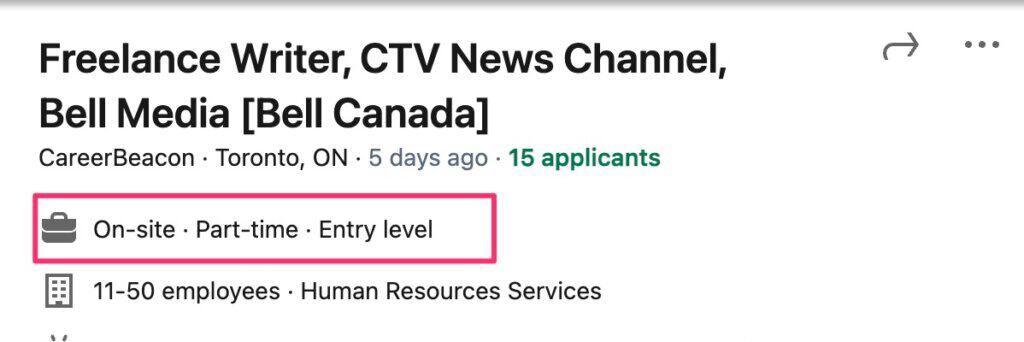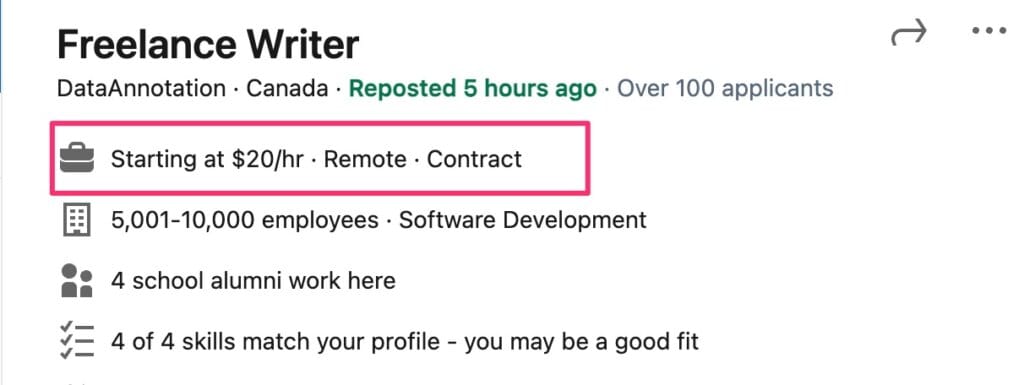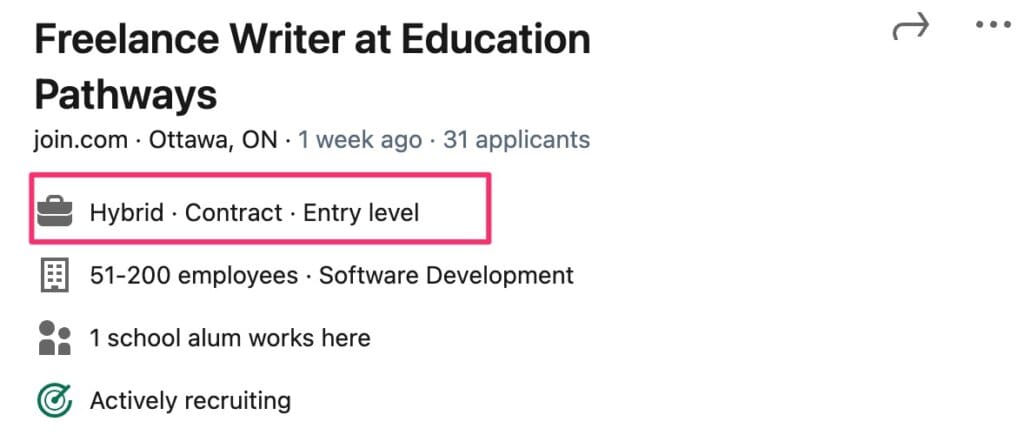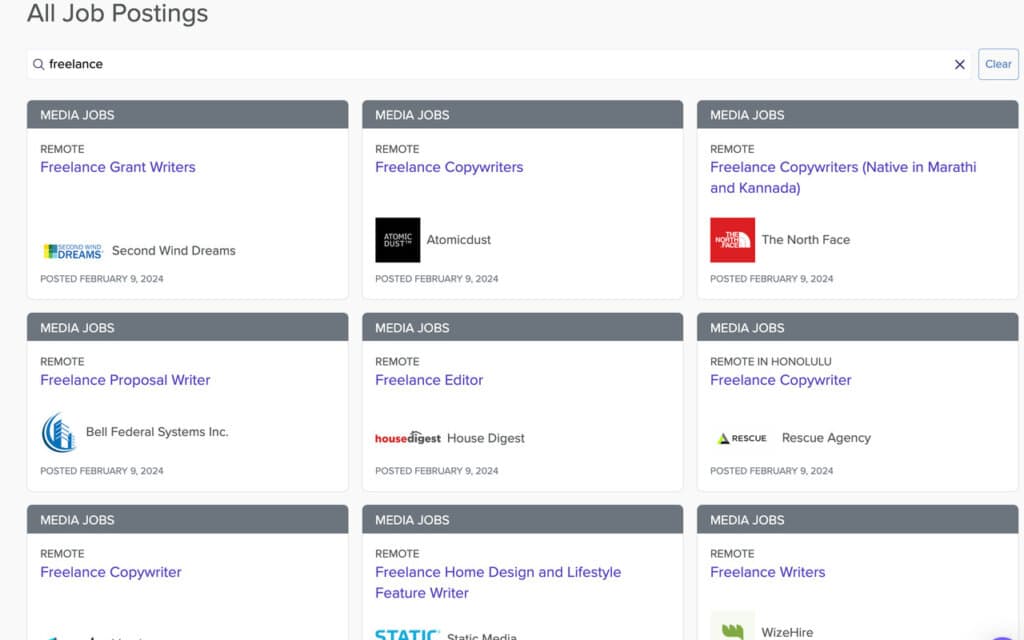So, lately, whenever I check different job boards and platforms, I’ve been noticing something shifting with freelance writing jobs.
At first, I only saw one or two jobs, but then as the months rolled by, it seemed like whole job boards are dedicated to these seemingly-looking freelance writing jobs.
Yes, they even lean on being fake freelance writing jobs.

I’ve seen them on LinkedIn and on different job boards.
And it’s sad too.
I mean, you get excited about finding all of these amazing online writing opportunities and so you go to LinkedIn, go to the job section and see hundreds of potential jobs for you!
There they are! All for you to take.
But, if you look at these writing jobs closely, they aren’t what they say they are.
What gives?
So, I want to share how you can spot these types of freelance writing gigs so you can avoid them for good.
What’s Happening With Freelance Writing Jobs
When I started looking at writing job boards way back in 2014, I was amazed that there were dedicated job boards JUST for freelance writers.
Problogger was one job board that only posted content writing jobs.
Then there was Blogging Pro.
And over the years, new job boards and job sites started to crop up, with even more writing job potentials!
But, with this influx of job sites, also came a new crop of “freelance” jobs.
These new freelance jobs for writers termed their ad this way:
- Contract position – A company hires you for a specific time frame until you complete the project or until you sign another contract. As a freelancer, you usually get paid per article or deliverable.
- Required a cover letter and resume – Many of these jobs required the writer to submit a cover letter and resume. As a freelance writer, it’s better to show your portfolio than a resume. Portfolios are up-to-date and show all your writing work.
- Pay was set as an hourly rate – I hate seeing rates this way. As a freelance writer, we set our own rates via per word or per project because we are business owners.
- Some jobs wanted you to do a timed test – Some companies require you to write a timed test unpaid. This is something I don’t agree with, and if you have a portfolio filled with articles, that should be enough for a company to see your skill level and knowledge.
- Long application process – Businesses may have multiple application processes to hire a writer. You may have to take a test, take 2-3 interviews and take another test before they decide you are their writer. Again, this isn’t appropriate for a freelance position. We have our own business and should be treated as another business owner.
- Remote position – even though it’s a freelance position, it’s also a remote position, meaning you work for the company instead of collaborate with the company as another business owner.
So, as you can see, these types of jobs are categorized as freelance jobs!
Can you believe that?
A full-time contract freelance job?
It just doesn’t make sense to me.
Employee Mindset
The companies that use these terminologies or frameworks to advertise a writing job are viewing it from an employee mindset.
They view us – the lonely freelance writer – as an employee, a commodity that can be terminated, switched or moved around at any time.
And for brand new online writers, you may not even REALIZE this at all!
I mean, for most of your life you probably applied to these sorts of jobs, right?
Of course you need a cover letter and resume for a job…duh!
Of course they pay hourly…how else can you get paid?
I get it. I was you before I started freelancing!
But, as a freelance writer, you are more a business owner than a writer.
And that means acting like a business owner.
A landscaper with their own lawn mowing business isn’t going to hand me their cover letter and resume to get the gig.
Instead, I would want to know who they worked with and check out his skill to get an idea if this person is legit.
That’s the same for us – a company shouldn’t care about your cover letter or resume. Instead, they should want to view your portfolio or a select few of relevant writing samples to get an idea if you’re the writer for their blog.
Here’s Proof Of What I’m Seeing On Job Boards
So, what do thees “fake” freelance writing jobs look like?
Over on LinkedIn, you can use their job section and if you type in, “freelance writer,” you will see hundreds of jobs for you.
But, look closely – companies will title their job ad, “freelance writer” but the ad will have contradictory information.
For example, this gig for CTV News calls for an on-site freelance writer. What?

I mean, technically, companies hire freelancers and so I guess you can be on-site, but as an online freelance writer, this just doesn’t make sense.
The next one pays hourly and even though the title says freelance writer, the job is a remote position for a company.

This probably means you are seen as an employee and not a freelancer. And, I didn’t become a freelance writer to have multiple jobs.
And this writing gig is hybrid. I’ve never had a client ask me to work in their office, mainly because I don’t live in their country.

Most of my clients aren’t even in Canada, the country I currently live in.
They are in the UK, in the States, in Tel Aviv or South America.
That’s the beauty of working as a freelance writer, you have the ability to work with anyone, anwyhere.
I don’t know about you, but that’s a nice perk to have!
So, as an online freelance writer, how can you find legit freelance writing jobs?
Finding Legit Freelance Clients as a Writer
Let’s look at legit and proven methods to finding a client that will pay you for your writing…and not expect a resume, or to come into the office three days a week!
1. Visit Content Writing Job Boards
As I said, there are dedicated job boards for content writing.
If you spend your time visiting those, you won’t have to worry about these remote writing jobs.
While many of these content job boards also have media and other freelance jobs, you can be assured that the jobs on these platforms will be actual freelance jobs.
And if you can only filter ‘freelance’ in the list, you’ll have better success finding legit freelance jobs.

2. Consider Cold Pitching
Cold pitching is the process of finding companies that aren’t actively hiring freelance writers and then pitching your services to them.
It can seem daunting and time consuming, but it’s one of the best ways to finding your ideal client.
With cold pitching you need a process:
- Gather a list of leads
- Find the right person to contact
- Finding their email address (or be able to message them on LinkedIn)
- Crafting a personalized pitch
- Circling back if you don’t hear back
The most lengthly process if finding that list of qualified leads.
In my Book Clients in 30 Days Challenge, I’m going through my cold pitching strategy and many students are gaining a disciplined tactic they can repeat.
The one thing to remember with cold pitching is that it’s very (very) time consuming. You might have to send out hundreds of pitches before you land a writing job, so be prepared for the long haul.
3. Do Warm Pitching and Outreach
With this process, you’ll be building up your network and brand so that you attract the right clients.
It is a longer process but it’s more passive (in a way).
So, this might mean:
- Posting more frequently on LinkedIn
- Guest posting
- Comment on social media (to other freelancers, editors and content marketers)
- Writing on Medium
Don’t Fall for These Freelance Writing Jobs
I hope this post will help you see all the different types of writing jobs out there.
For me, I like the freedom of choosing my clients and writing the types of content I want (blog posts).
Let me know in the comments below if you fell for these jobs!




3 Comments